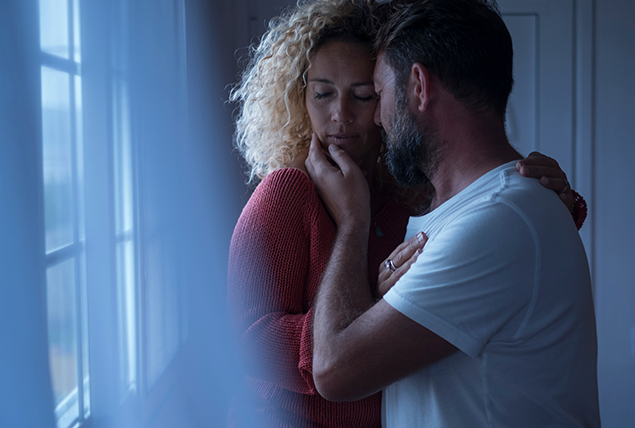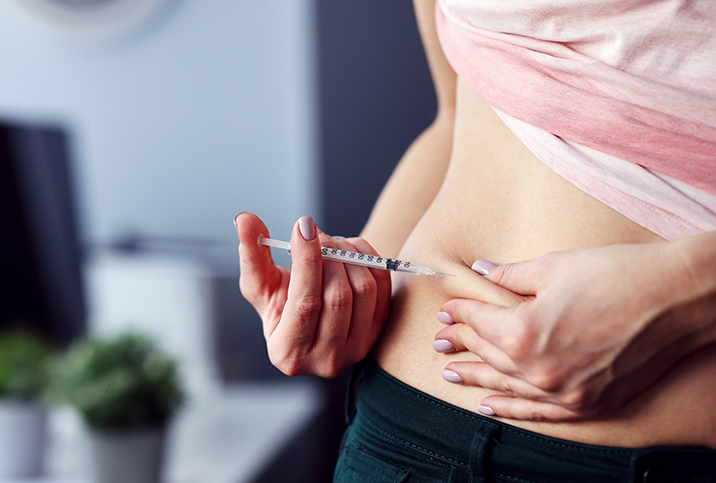Living and Loving With Diabetes

An estimated 37.3 million people in the United States—about 1 in 10—have diabetes, according to the Centers for Disease Control and Prevention (CDC). Of those, about 1 in 5 don't know they have it.
Even more people have prediabetes, which indicates that a person's fasting blood sugar is elevated but not quite enough for a type 2 diabetes diagnosis.
Since there are often no early symptoms of chronically elevated blood sugar levels, it's no surprise prediabetes and early diabetes can easily go unnoticed.
Type 1 diabetes happens when the body can't make insulin, and if you have this condition, you must take insulin daily to survive. However, type 2 diabetes means the body doesn't use the insulin you have properly. Type 2 can be brought on by a number of lifestyle choices and preexisting conditions.
"Diabetes usually happens when a patient with genetic predisposition has other added lifestyle factors that can contribute to insulin resistance and, eventually, type 2 diabetes," said Ana Kausel, M.D., board-certified endocrinologist and co-founder of Anzara Health in Miami. "Obesity, PCOS [polycystic ovary syndrome] and any condition that makes you gain weight—like taking certain medications, for example—can put someone at risk for diabetes. Lifestyle choices like a diet high in processed foods and sugar, or fructose, can cause fatty liver and, eventually, diabetes, not necessarily related to obesity."
Diabetes is the seventh-leading cause of death in the U.S. Though this status is frightening, the good news is a type 2 diabetes diagnosis is preventable. And even if you have been diagnosed with type 2 diabetes, there are ways to mitigate the disease's effects in order to live a happy and fulfilling life—in and out of the bedroom.
The effect of diabetes on the body and your libido
Diabetes has the ability to affect every system in the body, including the systems responsible for proper hormone and sexual function, such as the autonomic nervous system, Kausel said.
"Male patients with type 2 diabetes usually develop sexual dysfunction due to vascular and nerve problems of the penis," she added.
Debra Laino, a certified sex educator and clinical sexologist and member of the Sweetlife Diabetes Center board of directors in Wilmington, Delaware, agreed that numerous issues caused by diabetes can affect sexual function.
"Blood flow is also impacted with unmanaged diabetes, reducing blood flow to the genitals," she said. "Lack of energy, side effects from medications and even depression with the diagnosis can have an impact, as well as medication for the depression. Diabetes can also lower testosterone, which will lower sex drive in both males and females."
Can you catch and reverse diabetes early?
Unfortunately, diagnosing diabetes early can be difficult to do without regular blood screenings. Diabetes can present in many different ways and those symptoms can vary between individuals, so sometimes there are no noticeable issues initially.
"Sometimes there are no symptoms," Laino noted. "Some common symptoms are excessive thirst and excessive urination, fatigue, and some people have vision issues and weight loss. Some also have excessive hunger."
Though these symptoms are common among people with diabetes, they usually are not present in the disease's early stages.
"The problem with diabetes type 2 is that it is asymptomatic until it's really advanced," Kausel said. "It's estimated that when someone has been diagnosed with type 2 diabetes, the body has been under stress for about 10 years."
It's also very difficult to reverse type 2 diabetes once it presents. However, prediabetes, which is indicated by a fasting blood sugar level of 100 to 125 milligrams per deciliter (mg/dL), can be reversed with healthy lifestyle changes such as sugar control and exercise.
Diabetes treatment and outlook
If you've received a diabetes diagnosis, you may be concerned about what it means for your body and overall health.
Thankfully, diabetes is very treatable, and with the right tools and lifestyle interventions, people with diabetes can protect the health of their internal organs and live full lives.
Kausel explained that establishing healthy habits to control sugar and promote weight loss is the best place to start. Losing 5 percent to 7 percent of your body weight can prevent prediabetes from becoming diabetes and help prevent complications if you already have diabetes.
"The best way to prevent complications of diabetes—which usually happen over the years of being diagnosed with diabetes—is glucose control and weight loss," she noted. "Also, it is more important that glucose control and weight loss come from not only being on the right medication but also having healthy lifestyle choices that protect your liver from making toxins [low sugar] and feeding the good bacteria in the gut [high fiber]."
Thanks to the miracles of modern medicine, your doctor can prescribe various medications in tandem with lifestyle changes to help you optimize your sugar control and protect your body systems from diabetes complications.
"Nowadays, there are excellent medications that not only work to optimize insulin levels but work in different organs in the body to improve metabolic health in general," Kausel added. "Some of them also prevent cardiovascular and kidney disease and help with weight loss."
Keeping intimacy alive while living with diabetes
If you manage your diabetes with the right combination of lifestyle interventions and medications, you'll be on the right track for maintaining your sexual health. But it's just as important to continue to actively prioritize intimacy in your relationships.
Diabetes may affect your energy level for sex, and thus, your confidence in the bedroom. But of course, sex isn't the only way to have intimate time with your partner(s). Sometimes just spending time together and finding new sources of pleasure can go a long way toward reclaiming your intimate life following a diagnosis of diabetes.
"Having diabetes isn't a sex death sentence," Laino explained. "When it's managed well, people can live a healthy, fulfilling life. Keep intimacy alive. If there is some depression or fatigue, try lying in bed together and just caressing. Find areas on the body that feel good and learn to grow these areas."


















